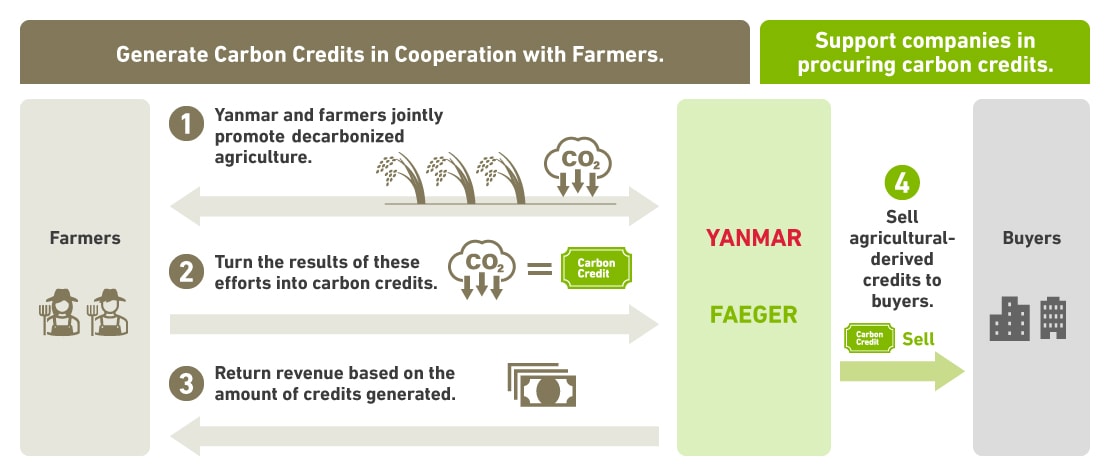News Release
Yanmar Collaborates with Faeger on Methane Reduction in Philippines Rice Paddies
June 28, 2024
Yanmar Holdings Co., Ltd.

Osaka, Japan (June 28, 2024) - Yanmar Agri Co., Ltd., a group company of Yanmar Holdings, and its local subsidiary, Yanmar Philippines Corporation, have agreed to collaborate with Faeger Corporation in efforts to reduce methane emissions from rice paddies in the Philippines using the water management method known as Alternate Wetting and Drying (AWD). Demonstration tests are set to commence around November 2024 towards promoting early adoption of the system and realizing the benefits of decarbonization.
In the Philippines, methane from rice paddies is estimated to account for approximately 20% of the total greenhouse gasses emitted across all industries*1. Therefore, there is an increasing need to reduce methane emissions from rice paddies. Japan's Ministry of Agriculture, Forestry and Fisheries is promoting the utilization of the Joint Crediting Mechanism (JCM) in the agricultural sector supported by a Measurement, Reporting, and Verification system (MRV) system*2 to encourage widespread use of the AWD method in the ASEAN region and reduce methane emissions.
Yanmar Agri and Yanmar Philippines will collaborate with Faeger to accelerate the adoption of these systems. The efforts aim to ensure income for local agricultural producers through the creation of carbon credits and to advance decarbonization in the agricultural sector.
Project Overview:
In this project, Yanmar Agri, Yanmar Philippines, and Faeger will collaborate to verify methane emission and reduction levels in Philippines' rice paddies through demonstration tests. They will also simulate farmer income from the creation of carbon credits. Leveraging the network of famers and agricultural stakeholders across the Philippines, developed through the sales of agricultural machinery by Yanmar Agri and Yanmar Philippines, and utilizing Faeger's expertise in carbon credits, the project aims to generate carbon credits in cooperation with local producers.
In addition, the Yanmar Group will use the credits generated through this initiative for carbon offsetting efforts. This approach will contribute to the development of sustainable agriculture that balances environmental impact reduction with increased producer income.
About Alternate Wetting and Drying (AWD):
AWD is a water management technique used in rice cultivation. Rice paddies in the Philippines are typically continuously flooded, which promotes the activity of methane-producing bacteria in the soil. AWD involves periodically drying the rice paddies and supplying oxygen to the soil, thus inhibiting the activity of these bacteria and reducing methane emissions compared to constant flooding.
Additionally, conventional rice cultivation requires a large amount of water to maintain the flooded state, which poses a challenge in regions with insufficient water resources. AWD significantly reduces water usage by intermittently drying the paddies. It is also expected to reduce fuel consumption by water pumps. This method is gaining attention for its potential to reduce greenhouse gas emissions.

- *1Based on data from CLIMATE WATCH and researched by Yanmar.
- *2The multi-step process to measure the amount of greenhouse gas emissions.
- *3The National Agriculture and Food Research Organization: Alternate wetting and drying reduces methane emission from irrigated rice paddy field in Southeast Asia (Japanese)
https://www.naro.go.jp/project/results/4th_laboratory/niaes/2017/niaes17_s12.html - *4Rice Science for Decision-Makers Vol.11
https://www.philrice.gov.ph/wp-content/uploads/2022/10/RS4DM-Alternate-Wetting-Drying-Technology-Vol.-11.pdf
About Yanmar
With beginnings in Osaka, Japan, in 1912, Yanmar was the first ever to succeed in making a compact diesel engine of a practical size in 1933. A pioneer in diesel engine technology, Yanmar is a global innovator in a wide range of industrial equipment, from small and large engines, agricultural machinery and facilities, construction equipment, energy systems, marine, to machine tools, and components — Yanmar’s global business operations span seven domains. On land, at sea, and in the city, Yanmar provides advanced solutions to the challenges customers face, towards realizing A Sustainable Future. For more details, please visit the official website of Yanmar Holdings Co., Ltd.
About Faeger
Faeger is a company that collaborates with farmers to generate carbon credits. It is one of the few companies in Japan that can consistently handle everything from the creation to the sale of carbon credits. Faeger provides these credits to business as "credits that show the face of producers committed to decarbonization", providing value not only through carbon offsets but also in public relations. By supporting the process of credit creation and purchasing, Faeger brings revenue to farmers and promotes activities to reduce CO2 emissions in agriculture.
Press Release Download
- Note: Information contained in the news release is valid at the time of publication and may differ from the most recently available information.
Inquiries
Corporate Communications, Yanmar
newsroom@yanmar.com


